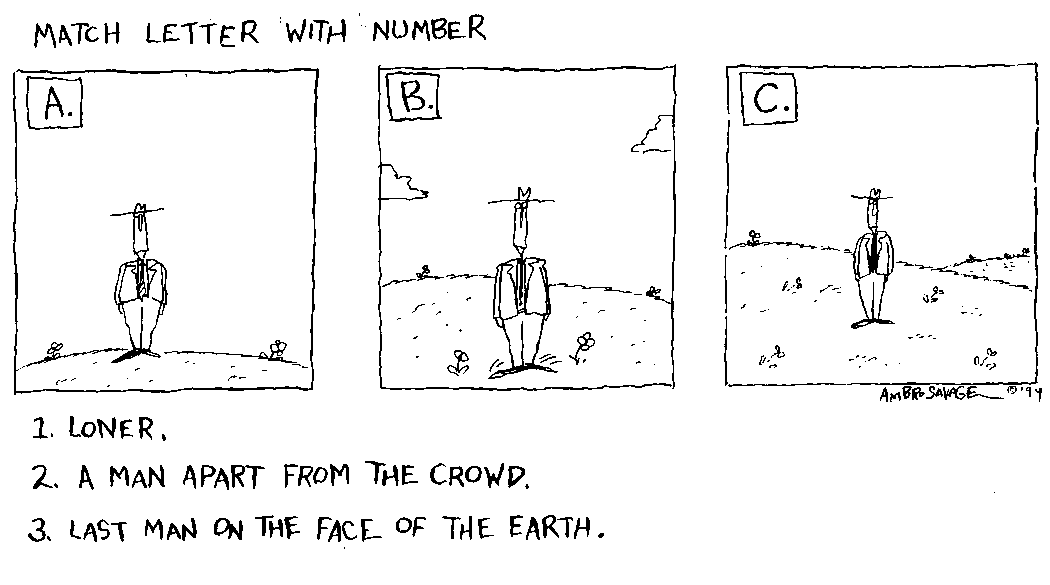|
||||
|
|
|
|||
| Home | Subscribe | Back Issues | The Organization | Volunteer | ||||
|
||||
|
Appreciating the Bitterpart 2 (conclusion): Please don't ease my painby Doug CollinsPart 1 of this article explored the parallels between the excess of sweeteners in American food and the use of routinely "sweet" happy endings in American films and children's storybooks. You can read it online at www.wafreepress.org/79/goodIdeas.shtml.
Another "sweet" cultural tendency is related to the American view of pain. Behind nearly every American bathroom mirror lies an incredible array of medicines--incredible at least in the eyes of many Europeans I've met who have visited in American homes. Many of these medicines are painkillers, magic bullets for the discomfort of headaches or other woes, which in most cases do nothing to solve any underlying problem. Americans seem extremely averse to pain, taking painkillers even for mild headaches. Taking painkillers is much less common among Japanese. Even during the intense pain of childbirth, only about 10% of laboring mothers in Japan use any sort of painkiller (my wife, who is Japanese, read this figure in one of her Japanese pregnancy books). When we were in the hospital in Seattle during our child's birth, one nurse told us that about 90% of the mothers here use painkillers. My wife explained to me that in Japan, women often think that if they don't feel the natural pain of giving birth, then they won't feel as close to the newborn. In addition to emotional concerns, health is also a factor: in a recent article, Australian physician Sarah J. Buckley points out the many documented health risks--both to mother and child--of using painkillers during childbirth. ("The Hidden Risks of Epidurals" Mothering, Nov/Dec 2005) Painkillers such as acetaminophen (Tylenol) are frequently used on very young children in the US for suppressing even mild fevers, despite the fact that the usefulness of natural fever in fighting infections is well-documented, and that fever in small children may even be necessary in building the immune system. In addition, acetaminophen has been associated with a variety of harmful side effects, including liver failure. ("Is Fear of Fever Hurting Our Children?" Edda West, www.vran.org/news_art/articles/fear_of_fever.htm) Although painkillers don't have a sweet taste, the similarity with sweet foods and sweet story-endings is that they are all three used as alternatives for bitter sensations that might naturally occur. All three give quick, easy, temporary comfort to the individual that consumes them. In all three cases, the comfort is often given to children. In all three cases, the comfort can lead to unhealthy use.
Some might choose to completely avoid sugary food, happy endings, and painkillers throughout their lives. But I'd say that's puritanically missing the point, perhaps creating a reverse problem. All three might be enjoyable or useful in some amount. The real question for me is why are so many Americans addicted to large quantities of these, while far fewer people in other countries seem to be? I'm tempted to point a finger at the corporations who market all these goods to us, but it's true that similar corporations in Europe and Japan don't choose to market in such an unhealthy way. Sure, corporations are pandering to us, but as a population, we are buying the product. Part of the problem certainly lies within us: a discomfort that is hungry for comfort. I personally suspect this discomfort is related to the feeling of loneliness so common here. Although living alone doesn't necessarily mean that you are lonely, it certainly increases the chance of it. And the proportion of American one-person households has increased from 9% of all households in the 1950 census, to 26% in the 2000 census. Being with people also doesn't mean that you won't be lonely. After both working full-time and taking care of household chores, partners in two-earner homes may not have much time to spend with each other. And sometimes people who are together just don't relate. In the US, I've had the repeated ironic experience of feeling lonely sometimes at parties, because people--perhaps myself included--were so distant. When people become detached and self-absorbed, they lack the connections and insight needed to appreciate the bitter that balances the sweet. Without a cultural tradition to learn from, why would you ever try to develop a taste for bitter foods? Without a sense that your efforts or feelings mattered to others, why would you feel any need to watch tragic movies? Without an idea that maybe nature intends you to have a headache right now, why would you avoid painkillers? The real culprit in the American tendency toward excess and addiction is the distance that we place not only between one another, but also between ourselves and tradition, and between ourselves and nature. American individualism has morphed into isolation, as though a quiet epidemic of low-level autism has befallen us. This has affected people of all political stripes and all beliefs. We turn to pills, boxes of cookies, and formula movies in order not to have to consider our condition.* |
|

